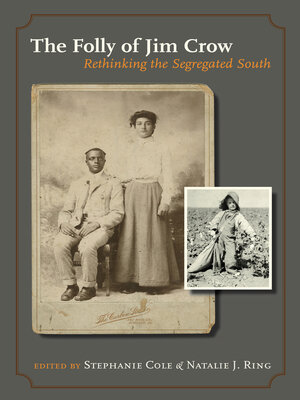The Folly of Jim Crow
ebook ∣ Rethinking the Segregated South · Walter Prescott Webb Memorial Lectures
By Stephanie Cole

Sign up to save your library
With an OverDrive account, you can save your favorite libraries for at-a-glance information about availability. Find out more about OverDrive accounts.
Find this title in Libby, the library reading app by OverDrive.



Search for a digital library with this title
Title found at these libraries:
| Library Name | Distance |
|---|---|
| Loading... |
Although the origins, application, and socio-historical implications of the Jim Crow system have been studied and debated for at least the last three-quarters of a century, nuanced understanding of this complex cultural construct is still evolving, according to Stephanie Cole and Natalie J. Ring, coeditors of The Folly of Jim Crow: Rethinking the Segregated South. Indeed, they suggest, scholars may profit from a careful examination of previous assumptions and conclusions along the lines suggested by the studies in this important new collection.
Based on the March 2008 Walter Prescott Webb Memorial Lectures at the University of Texas at Arlington, this forty-third volume in the prestigious series undertakes a close review of both the history and the historiography of the Jim Crow South. The studies in this collection incorporate important perspectives that have developed during the past two decades among scholars interested in gender and politics, the culture of resistance, and "the hegemonic function of 'whiteness.'"
By asking fresh questions and critically examining long-held beliefs, the new studies contained in The Folly of Jim Crow will, ironically, reinforce at least one of the key observations made in C. Vann Woodward's landmark 1955 study: In its idiosyncratic, contradictory, and multifaceted development and application, the career of Jim Crow was, indeed, strange. Further, as these studies demonstrate—and as alluded to in the title—it is folly to attempt to locate the genesis of the South's institutional racial segregation in any single event, era, or policy. "Instead," as W. Fitzhugh Brundage notes in his introduction to the volume, "formal segregation evolved through an untidy process of experimentation and adaptation."







